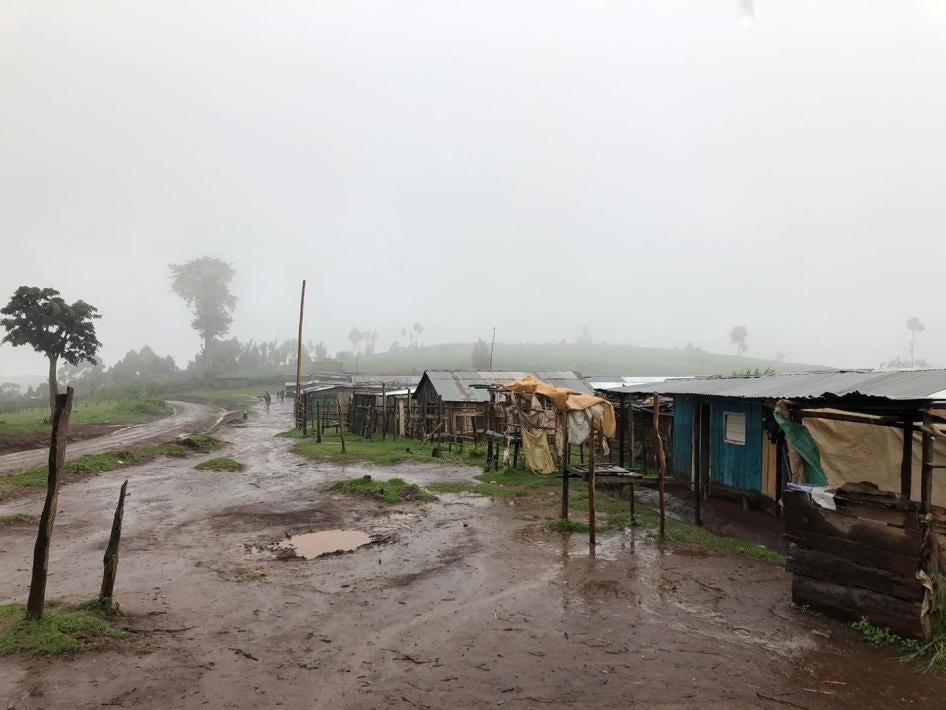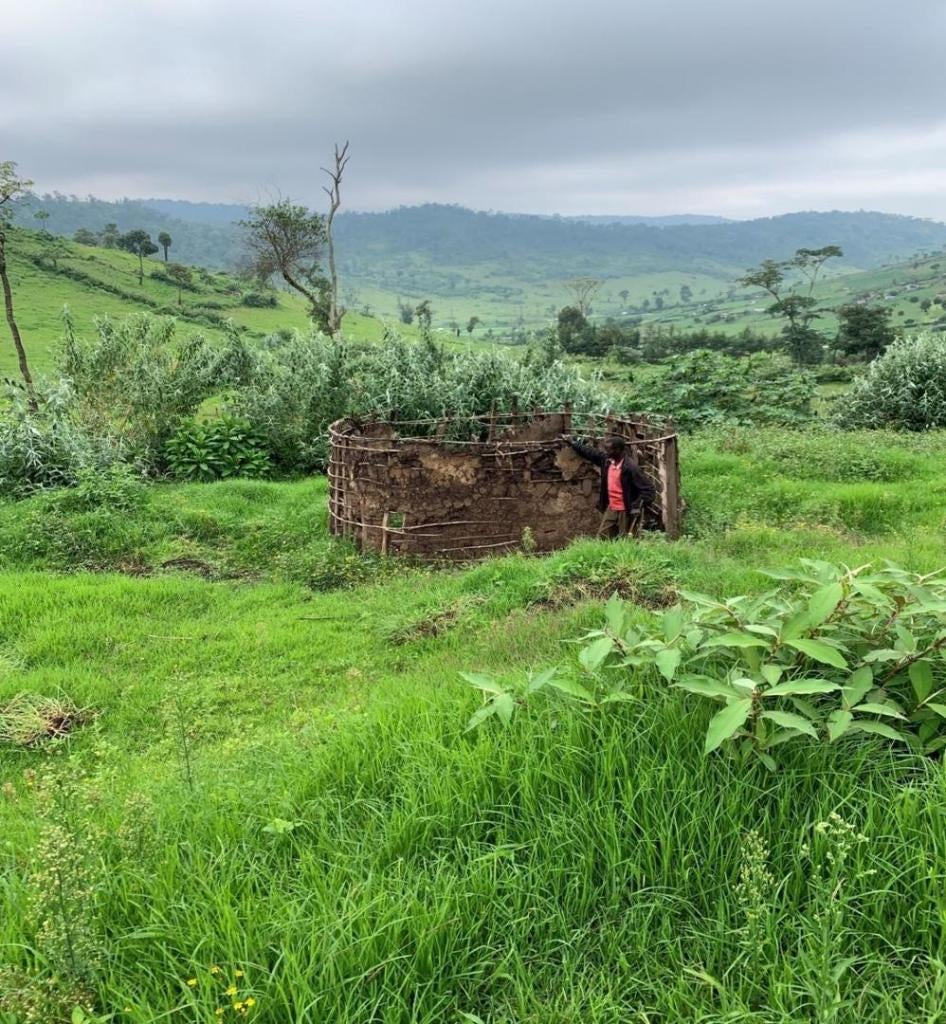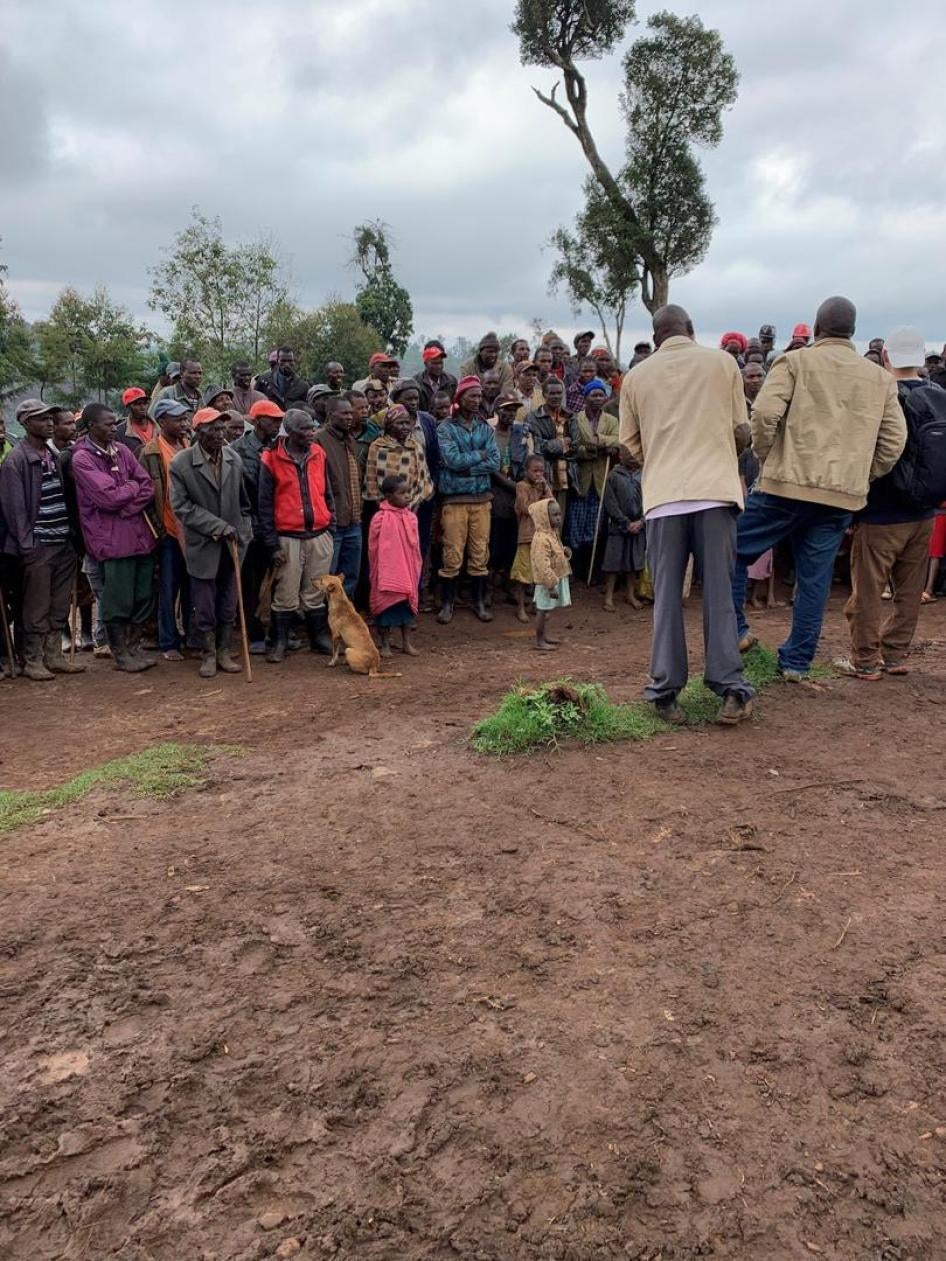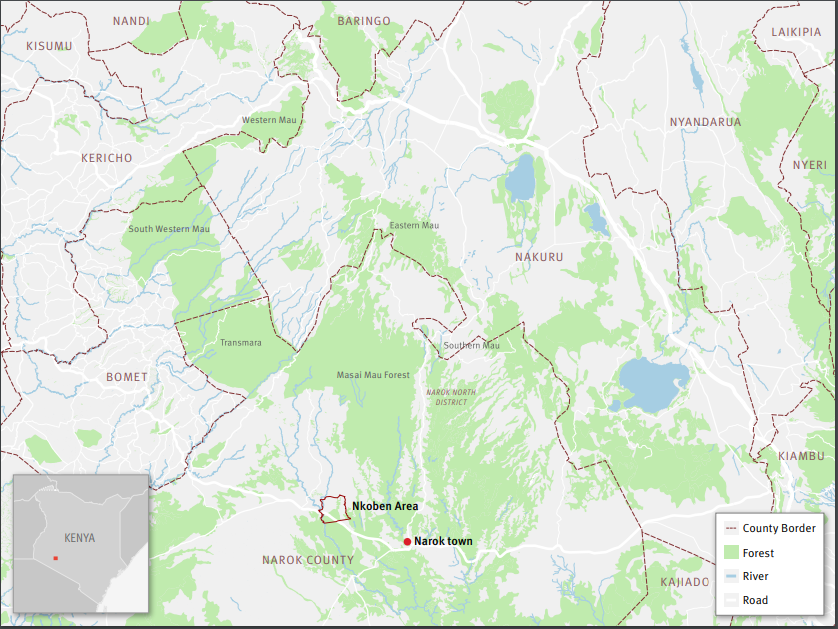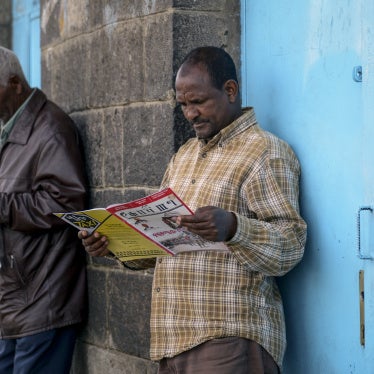(Nairobi) – Authorities in Kenya have not investigated abuses by security officials during the forced evictions of thousands of people from Mau Forest in July 2018 and now are planning more evictions, Human Rights Watch said today. In August 2019, the government announced plans to evict another 60,000 people from the forest. The authorities should ensure that police officials do not use unlawful force, and should provide the residents with adequate notice and compensation as required under Kenyan and international law.
The evictions of people who have settled on forest land are an effort to save the Mau ecosystem, which the authorities say is threatened by ongoing encroachment, heavy deforestation, and illegal settlements. The recent evictions targeted people who have settled on Maasai Mau, a block of Mau forest managed by the Narok county government that is held in trust under the Mau Trust Land. The Kenya Forest Service manages another 21 blocks.
“In efforts to preserve Mau forest, the government has conducted evictions in an abusive, unlawful manner, and isn’t following its own guidelines,” said Otsieno Namwaya, senior Africa researcher at Human Rights Watch. “While forest conservation goals are laudable, the way the government is carrying out the evictions raises serious human rights concerns.”
In June, Human Rights Watch interviewed 67 people in Maasai Mau and the Narok side, including people who had been evicted, conservation groups, police, and government officials. Researchers found that in early July 2018 a combined team of forest, wildlife, county, and national administration police deployed to the Maasai Mau forest on the Narok side and used excessive force to evict the communities that authorities say encroached forest land.
At least nine people, including two babies, died during the eviction. The officials beat people, torched homes, and destroyed crops, leaving thousands of people homeless and stranded in the cold. At least four people remain missing, and families say they have received no police support to search for their missing relatives.
In at least three locations, the evicted people moved elsewhere on the edge of the forest, setting up temporary settlements, most of them in Masaita, Gorofa, and Chepalungu villages in Nkoben area, Narok county. Community leaders said government officials evicted them again in December, allegedly to stop them from returning to the forest, destroying their temporary settlements in Gorofa, Masaita, and Chepalungu. But the families later managed to rebuild their temporary structures on those sites.
Officials have told them to return to their places of origin. The people said they had migrated from Bomet, Kericho, or Narok counties to settle on Mau forest land, and some, who had bought the land and acquired ownership documents, had been living there for more than 30 years.
The government has not investigated the deaths, injuries, and other abuses, though at least 30 families reported them to police stations in Narok county. At least two senior government officials in Narok revealed that the official debriefing report described the abuses, including destruction of settlements, food crops, and stores, and brutal treatment of the residents. “The number of houses burned or the number of those injured is in the debriefing report, which we can’t share,” one official said.
The new eviction plans include both people who have land titles and those without, according to government officials. The government has received court permission to cancel titles, contending that, although legal, the land was irregularly allocated and, in some cases, the titles were issued by “unscrupulous” officials. Criminal investigators in the town of Narok told Human Rights Watch that they were investigating government officials, both past and current, and will prosecute those found responsible for the irregular allocation of land and issuance of deeds.
In early August, the Land Ministry nullified over 1,274 title deeds in advance of the evictions. Families with titles have filed a challenge in a Nakuru court, but government officials say that everyone involved, with or without titles, will be evicted.
The people who now live in the scattered settlements on the forest edge said that at around 6 a.m. on July 7, 2018, more than 100 armed security officers from the Kenya Forest Service, Kenya Wildlife Service, Narok County Security team, and Rapid Deployment Unit of the Administration Police deployed to the edges of the forest-neighboring villages in Nkoben area such as the Chepalungu, Gorofa, and Masaita areas, on the Narok side of the Maasai Mau forest. They said the police raided homesteads, shot in the air, beat and evicted residents, looted, torched houses, and chased away anyone who came to salvage their goods or crops.
In some cases, the security officers used power saws to cut down houses or, in other instances, simply torched them. Victims said the security officers beat residents with big sticks and gun butts, injuring hundreds, and arrested and detained many others during the three-day operation. A 41-year-old man said:
“When I heard that evictions had started, I left church and went to check on my house. Police blocked me on the way, beating me up. Police were beating anyone who tried to access the houses.”
Human Rights Watch documented 9 deaths, although community leaders estimated that about 30 died. In Kararet village, when security forces evicted all the residents from the Enakishomi ranch, a 45-year-old mother of nine, who was being pursued by the evictions police, slipped and fell in a ditch with her 5-year-old daughter on her back. The daughter, Sharon Chepkoech, died four weeks later from her injuries.
Two people, one a neighbor to the victim and the other a relative, told Human Rights Watch that two other people committed suicide when they realized they had lost all they owned. Both their bodies were found dangling on a rope.
Family members of a man who has been missing since the evictions said that several months later, they had found the remains of a man they suspected was their relative near where the evictions took place. But they said a postmortem was never carried out to determine the man’s identity. In Reiyo area, a group ranch hived off from Mau forest in the 1970s, researchers saw the remains of an unidentified woman, who residents said died during the eviction, still lying in the forest.
Kenya adopted guidelines on evictions in 2009, three years after another violent eviction from Mau forest that the government halted following a court order. According to the guidelines, those being evicted should be given prior notification of at least three months, published in the official government gazette and served to the affected people individually or, where that is not possible, pinned in an open place where everyone can see it.
The guidelines require the authorities to ensure that no one is left homeless and to ensure adequate consultation with affected communities to develop or communicate a comprehensive plan for resettlement and compensation.
Government officials said they had issued adequate notice, including hosting public meetings with communities a month beforehand. But the people interviewed said they were unaware of the government’s plan to evict them.
No one interviewed has been compensated or resettled, and government officials in Narok said there is no plan for either resettlement or compensation, including for those individuals who had deeds to the land, as it was forest land and should never have been allocated to individuals. On August 18, the cabinet secretary for the environment, Keriako Tobiko, called the land encroachment a crime for which there can be no compensation: “You cannot pay people for crime. In fact, the government is being lenient. In normal circumstances, it jails people for crime.”
Under international law, forced evictions are a gross violation of human rights, and states must take all measures possible to prevent forced evictions. States have the responsibility to ensure compensation for the displaced communities, irrespective of whether they hold title deeds. The authorities should also respect the right to property of any individual, family, or community that owned the land. Where forced evictions are inevitable due to exceptional circumstances, such as where it is in public interest, the authorities are still required to adhere to international standards, including accountability for violations, as well as nondiscrimination and attention to vulnerable and marginalized groups.
The Kenyan government should ensure that abuses during forced evictions in Maasai Mau in 2018 are investigated and those responsible held to account, and that any ongoing evictions are carried out in a manner that respects national and international standards.
“Kenya’s government should ensure that evictions in the name of conservation are humane and lawful,” Namwaya said. “The authorities should address the past violations before proceeding with more evictions and ensure that evictions meet international and national standards.”
For details about the situation and accounts by victims, please see below.
History of Mau Forest Evictions
Originally covering over 400,000 hectares, according to the Narok deputy county commander, the Mau Complex of 22 blocks, extending through 7 counties, is the largest forest in Kenya and the single most important water catchment in the Rift Valley and western Kenya. The forest is the source of at least 12 rivers that feed into 3 lakes – Victoria, the world’s second largest freshwater lake, Nakuru, and Naivasha. In line with its climate change commitments, including reducing the levels of greenhouse gas emissions and the risks of drought or floods, Kenya’s government has been evicting people from the forest since 2004 to reclaim encroached forest land. Private conservationists and Land Ministry officials estimate this land at around 40,000 hectares.
Kenyan officials have said they are alarmed at the rate of encroachment and deforestation in Mau forest. Government officials and staff at a conservation group that works in Narok said that, according to their research, illegal settlements and deforestation of the Mau are altering the whole Mau ecosystem, leading to prolonged droughts, drying of rivers, and death of animals in the Maasai Mara Game Reserve.
At least 40 percent of the forest cover has been depleted by deforestation and encroachment by more than 50,000 people who authorities say were irregularly allocated land by government officials since 1974. Some have managed, with the help of “unscrupulous” government officials, to acquire ownership documents such as titles, according to a conservation group working in the Mau. “When it rains nowadays, we experience peak flows that are very high and very low base flows,” an official of the group said. “During recent drought in 2009 and 2019, Mara River and other rivers in the Mau basin dried up completely. If the Mau was intact like it was 50 years ago, the rivers would not have dried up.”
A land official in Narok said that the government aims to reclaim land that residents unlawfully occupied in block 22, the Maasai Mau, on the side of Narok county. Kenyan authorities allocated forest land to group ranches – tracts of 200-250 hectares for group farming and commercial activities, which is provided for under Kenyan law – and to individuals between 1973 and 1985. That was followed by another round of allocations in 2001. But Land Ministry officials say that some group ranches extended boundaries unlawfully into forest areas or subdivided the land to individuals, contrary to regulations.
Since 2004, Kenyan authorities have been trying to conserve Mau forest. An initial 100,000 people were evicted between 2004 and 2006, with serious abuses, according to Amnesty International and Kenya National Commission on Human Rights. The evictions stopped when the High Court in Nakuru awarded an injunction on behalf of seven people who had titles, which the government said it had canceled. The court said the government could not revoke titles without court orders.
In 2018, the authorities sought court permission to cancel the titles on the basis that the Mau forest land was irregularly acquired. The court granted the petition in June 2019, authorizing the government to cancel titles ahead of planning new evictions that will, in view of the court order, even include people with titles. The authorities told Human Rights Watch that they will evict all unlawful residents, with or without titles.
On July 7, 2018 the government began the first round of evictions. The second round was scheduled to follow in 2019, but community and political leaders in the Rift Valley have cautioned the government against carrying it out before the case filed in the Nakuru court about the 2018 evictions is concluded.
Government land policy over the last 50 years has contributed to the encroachment, said a 2010 report of the Task Force on Mau Forest Complex, through uncontrolled degazettement and excisions of forests and allocation of land to individuals, in some cases irregularly.
The government’s excision of land for group ranches between 1973 and 1985, five of which have since extended boundaries and encroached into the forest, is an example. The five – Sisian, Enkaroni, Enosokon, Anakishomi, and Reiyo – have enhanced their allocated area by an extra 1,807 hectares, according to a Land Ministry official. In 2001, the government excised another 61,587 hectares of the forest to allocate to individuals. Since 2001, communities have encroached on an estimated 29,000 hectares. In the same period, government officials irregularly allocated over 17,000 hectares in the Maasai side of Mau.
2018 Evictions
In June 2019, Human Rights Watch visited camps for the displaced people of Mau in Narok and interviewed 67 people, including victims of forced evictions, community leaders, witnesses, conservationists, officials from Kenya Wildlife Service, Forest Service, Land Ministry, Environment Ministry, national government administrators, and police investigators. Human Rights Watch worked closely with partner organizations in Narok to identify people evicted and community leaders, and further cross checked the information with government officials and police. Researchers focused only on the violations during the July 2018 evictions from the Maasai Mau Forest, Narok county.
Deaths, Missing People
Human Rights Watch found that at least nine people died and others remain missing following the evictions. Witnesses and victims said that the evictions team fired gunshots in the air, in some cases aiming lethal fire at fleeing residents, but most of the people who died fell while fleeing. In June 2019, researchers saw the remains of a man and a woman, who survivors of the evictions said had died after police who were pursuing them shot them dead and abandoned them there.
A relative said that on July 8, 2018, 5-year-old Sharon Chepkoech fell off her 26-year-old mother’s back, as her mother fled the evictions team, which had demolished their house and destroyed their food store. Sharon fell ill and died in Masaita camp a week after the fall, a family member said.
In another incident, a 39-year-old man said that his 52-year-old mother, Elizabeth Tuwei, died at Tenwek mission hospital, Bomet County, in September 2018, where she had been admitted after the evictions. “The evictions team came with power-saws, which they used to destroy everything, including food stores, crops in the farms and all our houses,” said Richard Ng’eno, her son. “My mother collapsed in shock on July 7 when the evictions started and we admitted her at Tenwek hospital, where she died.”. The other victim, Richard Tanui, a neighbor of Elizabeth Tuwei, was fleeing the evictions team when he fell in a ditch in Oruwuit village and died instantly, relatives said.
Relatives of 20-year-old Sharon Ng’etich and 12-year-old Mercy Chepkoech, a former standard six student at Reiyo Primary school, both of Chepalungu camp, said the two have not been seen since the day of the eviction. Sharon’s husband said: “My wife was seriously affected psychologically by the eviction, and she went missing when the eviction was still going on. She left me with three children, and we have never seen her again.”
A survivor said that, on July 7, in Lebekwet village, the evictions team, including administration police and Kenya Wildlife Service police, chased a 24-year-old man, Emmanuel Sigei, and started beating him: “They beat his neck, back and waist with a big stick until he fainted. They then dug a hole and wanted to bury him. They thought he was dead. People made noise and they stopped. No one has seen Sigei since that day. He could have died.”
Others who died included Gideon Kipkoech, in his 30s, a disabled man who starved to death when the evictions team violently dragged him out of his house and left him outside for days. Samuel Pere, a Maasai in his 50s, died in September 2018, during intercommunal violence between the Kalenjin, who opposed the evictions, and the Maasai, who supported them. The Maasai said that the drying rivers are leading to animal deaths in Maasai Mara Game reserve, with a negative impact on tourism, which is an economic mainstay for the Maasai in Narok county. Two other bodies of people who died there during the evictions were still uncollected in the forest at the time of the visit.
Beatings, Looting
All those interviewed said that a combination of wildlife police, forest police, county government security team, and the national administration police raided homesteads at 6 a.m. for three successive days, shooting in the air to disperse people and beating people, torching houses, destroying crops, and looting households and food stores. But government officials denied that the eviction was forceful.
A senior warden with Kenya Wildlife Service, Dickson Ritan, who was the head of the evictions team, said: “The process was very smooth. People were not evicted. They were just asked to move out, and this took just three days. We assisted people to carry their goods from their houses.” The deputy county commissioner for Narok, Arthur Bunde, who was part of the team that planned the evictions, said that the evictions were largely peaceful and only those who resisted were forced out, and there was no looting by the evictions’ officers.
All the 67 victims interviewed, including those who had escaped unhurt, said the authorities used force, including shooting at people. A 35-year-old man in Masaita camp who owned a shop, said that, when the evictions team raided his home on July 8, it demolished his shop, burned down his houses, destroyed crops, and beat him and his mother. His mother, Ruth Sigei Laboso, 55, fell and broke her leg as she tried to flee, he said.
A 93-year-old grandfather said police raided his Ororuit village home on July 8, beat him and his10 children, burned his three houses, clothes, and crops. Police beat one of his sons, 30-year-old Bernard Kiprotich, for instance, with sticks on the back and head, injuring him. Police forcefully took Ksh30,000 (USD300) from Kiprotich and never returned it. Kiprotich reported the incident at Malelo police station but police have never investigated it.
At least 30 people interviewed said the evictions team looted their household items, destroyed their food stores, and carried away the food. Julius Bor, 48, said that police burned down his food store with 30 bags of beans, 150 bags of corn, 15 sacks of potatoes, and 3 sacks of onions. Three men interviewed, one currently in Gorofa area and the other two in Chepalungu area, said the security team carrying out the evictions slaughtered and feasted on their goats, sheep, and cows.
Failure to Uphold Eviction Guidelines
Human Rights Watch found that Kenyan authorities have failed to respect both national and international laws, according to which all victims of forced evictions are entitled to adequate compensation and resettlement. Government officials in Narok told researchers that government would not compensate or resettle evictees, as they had encroached government land.
In addition, the authorities did not issue adequate notice to the affected people. Government officials said they informed people a month in advance of the evictions, and later issued with a two-week notice. But the guidelines require at least 90 days’ notice served individually to each person, and those interviewed said that residents were unaware of the intended evictions.
The guidelines require government officials to initiate consultations with the affected communities on the eviction plan, providing full information on the alternative settlement sites and compensation. The guidelines say: “The government shall ensure that, in the event that agreement cannot be reached on the proposed alternative by the affected persons, groups and communities and the entity proposing the forced eviction in question, the dispute shall, in the first instance, be referred to Mediation Committee consisting of representatives from the affected group, officials from the Ministry of Lands, representatives from the party intending to carry the eviction and a representative from the Kenya National Commission on Human Rights.”
The guidelines require the government to take special measures to ensure that there is no arbitrary deprivation of property or possessions as a result of eviction. Property and possessions left behind involuntarily should be protected against destruction, arbitrary, and illegal appropriation, occupation, or use.
But victims said that no one has been compensated and that the authorities have yet to compile a record of those evicted with the view to either compensating or resettling them. Since July 2018, the environment cabinet secretary Keriako Tobiko has repeatedly said to the media that none of those evicted would be compensated as they had illegally encroached on government land.
“Instead of getting money to resettle them, we want then to go back to where they came from. Some have returned titles willingly and gone back to where they came from,” said Arthur Bunde, the deputy county commissioner for Narok.
Lack of Accountability for Violations
Although Kenyan media have widely reported on the abusive evictions and some people have said they reported beatings and destructions of property to police, Human Rights Watch found that Kenyan authorities have not investigated them. A senior government official in Narok said that, after the eviction, the government carried out an assessment, which included details, including “how many houses were burned where.” Kenyan authorities have not released this assessment to the public.
A senior police officer in Narok attached to the Directorate of Criminal Investigations said that, even though he has been tasked to lead a team investigating issues relating to the Mau evictions, they are not looking into abuses resulting from the evictions. A Kenya Wildlife Service official in Narok who participated in the evictions said the authorities have not investigated the abuses because there were none: “No one has reported any abuses, whether its killings or beatings. The process was very peaceful. Our officers just escorted them out of the forest.”
At least 57 people interviewed described how the evictions team either looted homes and food stores or used violence against people. At least 30 said they had made official reports, including about deaths resulting from the evictions, at police stations in Narok but there has been no follow up.
Police have failed to intervene in intercommunal violence stemming from the evictions. The Maasai support government efforts to conserve Mau, including through evictions, while the Kalenjin, who have gradually moved into the forest since the 1974, have resisted. At least two Maasai families, including one that lost a relative during the intercommunal violence in September, said that police have failed to investigate the violence even though the affected families made official reports at police stations.
The family of William Pere, who was killed in mid-September inside Mau forest, where he had gone to retrieve his livestock when the violence erupted, said they made an official report at both Gorofa police post and Lulung’a police station. Although officers from Lulung’a station visited the crime scene, no further investigations have taken place since, and no one has been held to account.
